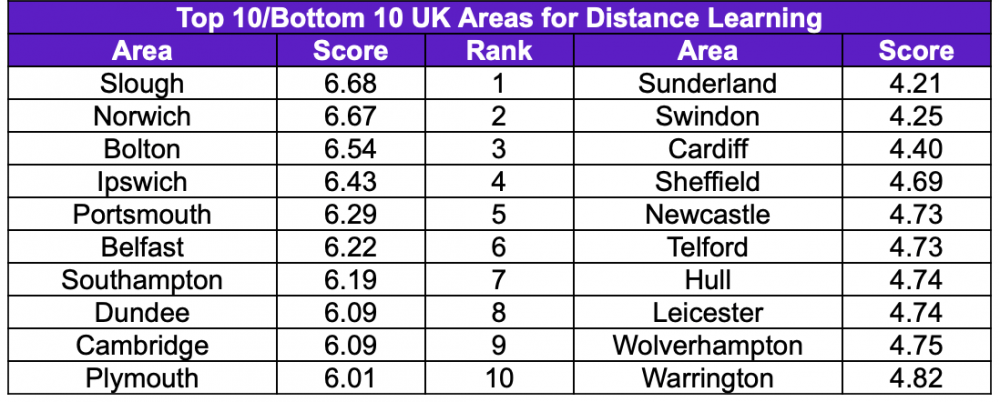According to research carried out by insurance provider Protect Your Bubble (PYB), Swindon ranks second in the top ten list of least favourable areas in the UK for distance learning.
The insurance company says despite Government efforts to stifle redundancies caused by the pandemic, unemployment is forecasted to reach 5.9 percent in 2022, with experts calling on those made redundant to retrain to aid their career.
This has led to surge in interest in online learning, for both mature and younger students, with those signing up for the Open University’s 2020/21 online courses increasing by 25 percent compared to the previous academic year.
With such a spike in curiosity for online learning, gadget insurance provider Protect Your Bubble (PYB) analysed the latest available data to reveal which cities and towns across the UK provide the best set up for distance learners.
To do this, the company compared the latest data available for nine deciding categories. These included percentage of premises with ultra-fast broadband, library reviews, cafes with free Wi-Fi, number of nature and parks, rent prices, utility prices, internet price, weekly earnings and median overtime hours worked.
Starting with the areas ranking towards the bottom, Swindon (at 4.25) is ranked the second-least suitable city for distant learners. It received low scores in categories such as number of cafes with free Wi-Fi (1.12), average library reviews (1.43), availability of green spaces (1.54), and utility affordability (3.46).
Protect Your Bubble said that despite having 14 individual libraries catering to the town, Swindon’s libraries seem to remain unpopular among residents, with average library reviews receiving a normalised score of just 1.43, the fourth lowest in the country, with Wolverhampton, Birmingham and Brighton taking the bottom spots.
Sunderland (4.21) is ranked the least favourable area for distant learners. The North-eastern city ranked poorly in categories such as the number of cafes with free Wi-Fi (1.16), availability of green space (1.29), weekly earnings (2.14) and access to ultra-fast broadband (3.71).
The biggest challenge Sunderland distance learners face were found to be facing is the lack of access to ultra-fast broadband (3.71) with download speeds averaging just 56.83 Mbps, 13.96 percent slower than the national average. PYB say Sunderland will soon have access to faster, more reliable speeds however, with works underway from CityFibre to introduce fibre optic broadband to the area – the fastest internet access technology in the country.
Sunderland residents also struggle to find a better work/life balance, with workers earning among the least in the UK, with a normalised score of just 2.14, only surpassing Bolton (1), Blackpool (1.17) and Ipswich (1.66) in weekly earnings. Additionally, employees work on average 7.4 hours overtime, the fourth highest in the country to make up for lower earnings.
That said, the city does score highly for rent affordability (9.87). Sunderland is the third cheapest area in the UK for rent prices, with residents on average paying just £574 per month. By comparison to London, the UK’s most expensive area to rent, Sunderland residents can expect to save £2,778 a month on rent.
Cardiff (4.40), Sheffield (4.69) and Newcastle (4.73) complete the bottom five areas least suitable for distant learners.
Of the 50 cities analysed, Slough is deemed the number one town for distant learners, scoring 6.68 out of a possible 10 across the different categories.
Slough scored highly in five of the nine categories, including availability of green space (9.04), the least amount of hours overtime worked (8.68), percentage of premises with ultra-fast broadband (8.63), average library reviews (6.43), and weekly earnings (5.89).
Slough residents, on average, were found to work just 5.9 hours overtime, the second lowest compared to Liverpool, Manchester, Blackpool, Warrington and Bolton residents who work on average 5.4 hours overtime. PYB say this suggests students could have more time to study due to the shorter working hours creating a better work/life balance.
The insurance provider said this is helped due to Slough residents receiving the third highest average wage in the UK. Earning on average £681.40 a week, beaten only by London (£852.80) and Derby (£779.10). With greater disposable income, students will have better chance of affording high-quality learning equipment, such as computers and faster broadband, as well as additional assistance such as childcare or tutoring to make learning easier.
The town was also among the top 10 areas for ultra-fast broadband, with 90.1 percent of premises having access to faster internet speeds. A slow or unreliable connection can have an impact on learning capacity, with over half of students stating that a poor internet connection hindered their learning.
Norwich followed closely ranking second for the best city for distance learners (6.67). The city not only scored the highest for availability of green space (10), but also for average library reviews (8.43), percentage of premises with ultra-fast broadband (7.68), internet affordability (7.62) and least amount of overtime (7.09).
Distant learners in Norwich are said to have the pick of the bunch for green space as it’s ranked best overall for the number of parks per Capita (10), with four of Norwich’s best parks receiving a Green Flag Award for 2021.
PYB say green space has been known to strongly improve stress, mental health and aid respite for over-stimulated minds, so students need to ensure they have access to as much green space as possible when learning.
Norwich narrowly missed out on the top spot due to its low scoring for weekly earnings (2.41), with residents earning just £536.60 a week on average, almost £200 a month less than the national average (£585.43).
Bolton (6.54), Ipswich (6.43) and Portsmouth (6.29) make up the rest of the top five cities for distance learning.
At the other end of the scale, Sunderland (4.21) is ranked the least favourable area for distant learners. The North-eastern city ranked poorly in categories such as the number of cafes with free Wi-Fi (1.16), availability of green space (1.29), weekly earnings (2.14) and access to ultra-fast broadband (3.71).
The biggest challenge Sunderland distance learners face is the lack of access to ultra-fast broadband (3.71) with download speeds averaging just 56.83 Mbps, 13.96 percent slower than the national average. However, Sunderland will soon have access to faster, more reliable speeds, with works underway from CityFibre to introduce fibre optic broadband to the area – the fastest internet access technology in the country.
James Brown, Director at Protect your bubble commented: “With the possibility of online learning becoming a reality for many, it’s important prospective students have the best start to their education.
"So looking into factors such as internet capabilities, cost of living and work/life balance gives an idea to see which cities are best suited for distant learners.
“Alongside these factors, it’s important students ensure the equipment they use for their work is covered in the event of damage, theft, or mechanical breakdown. Further education can be stressful enough without the possibility of losing your devices and work unexpectedly.”
Those interested in viewing the full UK-wide rankings can find them at https://uk.protectyourbubble.com/our-blog/blog/2021/12/09/revealed-10-best-cities-distance-learning










Your Comments
Be the first to comment on this article
Login or Register to post a comment on this article